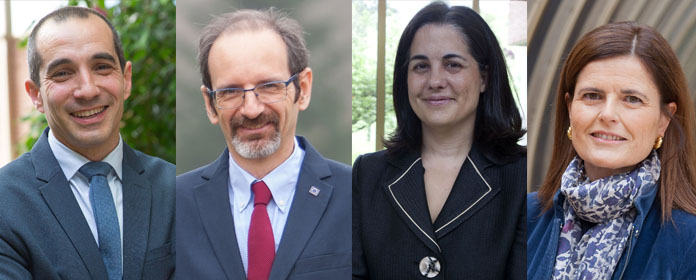News
LATEST NEWS AND EVENTS FROM THE SCHOOL OF ENGINEERING
Two University projects on air quality in housing and its adaptation to climate change receive 250,000 euros in the call Challenges
These are 3- and 4-year projects in which researchers from the schools of Architecture and Engineering, the School of Sciences and the University of Seville collaborate.

Two research projects at the University of Navarra, which seek to address the different sources of household air pollution and measures to be implemented to prevent the effects of climate change and heat waves in residential construction, respectively, have won 250,000 euros in the latest call of the Ministry of Science, Innovation and Universities "Proyectos de research and development+i Retos Investigación", recently resolved.
The first project -carried out by experts from the Departments Construction, Installations and Structures, of the School of Architecturedepartment of Environmental Biology, of the School of Science; and the department of Mechanical Engineering and Materials, of the School of Engineering- The aim is to analyze, quantify and reduce the movement of airborne pollutants from ventilation systems in residential buildings to urban environments: "Ventilation systems extract polluted air from wet rooms, kitchen exhaust hoods, sewage systems or garages and bring it outdoors, on the one hand, and introduce clean air into homes, on the other. In this way, in theory, the air quality parameters required by the rules and regulationswould be achieved," explains the head of project, professor César Martín-Gómez.
"However," he adds, "a significant amount of particulate matter is evacuated through the extraction of the kitchens. Likewise, through the ventilation pipes of the sewage networks of the blocks of apartments, a methane Issue is released to the outside, which has hardly been studied".
"This combination of polluted air -CO, CO2, CH4, PMs and VOCs- emitted by the residential housing stock as a whole into the atmosphere," continues the expert, "is normally expelled through the roofs of buildings, but it has hardly been quantified and we do not know how much of it returns, sooner or later, to the interior of the buildings." "Since", details the also responsible for project, the director of department of Environmental Biology of the academic center. Arturo AriñoIn the same way, "combustion vehicles circulating in cities emit gases and particles that are harmful to health, which re-enter homes through their own ventilation systems".
The project, which has obtained funding of 145,200.00 € for its development between June 2020 and June 2024, will finally propose measures for reduce or eliminate such contaminantsand its energetic or material recovery when possible," concludes César Martín-Gómez.
The project "Climate Ready. Adaptation Assessment of Spanish residential buildings", led by Aurora Monge and Ana Sánchez-Ostiz, professors at School of Architecture of the University of Navarra, has received an financial aid of 105,000 euros for its development for three years.
In its course, the research team - which includes 9 other specialists from the faculties of Philosophy and Letters (department of Geography), Science and Medicine (department of Public Health) - aims to assess the adaptive capacity of residential buildings to global warming, "promoting passive measures in the design and use of buildings to achieve an adequate indoor environment in summer conditions, and minimize the risks of indoor overheating with minimum energy demand for air conditioning systems when these are necessary," say the principal investigators of project, Aurora Monge and Ana Sánchez-Ostiz, respectively coordinator and director of the Master in design and Environmental Management of Buildings (MDGAE) of the academic center.
For this purpose, a characterization of construction typologies will be carried out through the direct testing of real risks by monitoring 30 houses in Pamplona and Seville; regions chosen for the climatic and typological differences of their residential constructions.
"We will collaborate with a group of experts from the University of Seville, who will carry out the field study there. We will conduct, on the one hand, a representative observatory based on surveys subject panel, then we will evaluate the adaptive capacity of dwellings through energy simulation and urban scale analysis with GIS tools; and finally, we will present an implementation proposal justifying that residential buildings are Climate Ready (prepared for the effects of climate change)," emphasizes Aurora Monge.
"This project not only has a scientific impact, but also a social and economic one, as the results will make it possible to reduce the risk of morbidity and mortality in vulnerable populations, such as the elderly, as well as to minimize risk situations in relation to heat waves, which are increasingly extreme and frequent. In addition, doing it at the city scale will make it easier to achieve more ambitious results, establishing priority areas of intervention for the rehabilitation of residential buildings," emphasizes Ana Sánchez-Ostiz.
